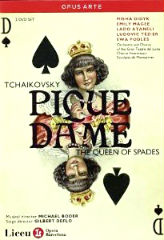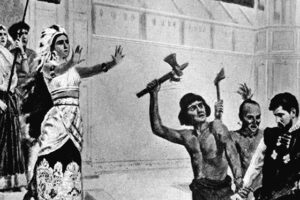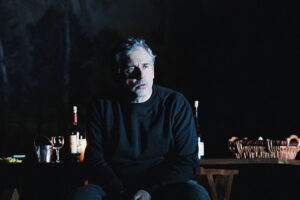
Tchaikovsky’s Queen of Spades straddles two genres. With a macabre plot that explores the boundaries of human obsession, it’s an early psychological thriller that makes the audience engage in a kind of voyeurism Alfred Hitchcock loved. Yet the plot drawn from Pushkin and the striking Romantic score with its references to Mozart, Bizet and Grétry firmly ground the opera in a bygone era of masked balls, crowned heads and high waistlines.
It’s the second frame of reference that dominates Opus Arte’s new DVD of a 2010 revival from Barcelona’s Gran Teatre del Liceu (2 discs, $39.99). The sumptuous costumes and Zefferellian sets dial back the action a half-century, from Tchaikovsky’s late 1800s to Pushkin’s lifetime.
Gilbert Deflo’s direction seldom breaks from stock operatic gestures and expressions, as if the characters are somehow constrained by the work’s Classical influences. The result is a production that’s easy on the eye but seldom approaches a boiling point and fails to adequately convey the neuroses and torment of its ill-fated protagonists, Hermann and Lisa.
Too bad, because the cast is pretty strong. The Ukrainian tenor Misha Didyk has a somewhat lighter and more lyrical voice than one often finds in this role, with a ringing upper range and a stage appearance that, if anything, makes him a bit too dashing for this high-strung, single-minded character. Though he spends a good part of the opera conveying anguish with a half-frown on, Didyk’s Act II attempt to extract the mysterious winning combination of cards from the Old Countess has the right degree of intensity without lapsing into melodrama.
American soprano Emily Magee packs a lot of punch into her portrayal of Lisa, consistently nailing the big notes with a ripe if hard-edged spinto that could use more subtlety. Her vocal shadings and acting don’t begin to convey a real flesh-and-blood character until the penultimate scene of Act III, at the Winter Canal, when Lisa obsesses over whether Hermann loves her, discovers he’s more interested in the gambling halls and takes her life by drowning.
The show-stopper of this performance may be Ewa Podles as the Countess, one of opera’ more memorable career-stretching roles. Haughty, nostalgic and vulnerable, the Polish contralto plants meaning in every phrase, sleepily recalling her youthful triumphs in the court of Louis XV with a hint of smoky sensuality befitting a character once known as the “Venus of Moscow.” She reappears as a fairly creepy ghost later on, emerging from a cloud of dry ice vapor (sadly, not breaking through the floor boards of Hermann’s barracks like at the Met) to deliver the ill-fated officer the secret three cards he so craves.
Among the rest of the cast, baritone Ludovic Tézier makes an elegant if stiff Prince Yeletsky, unfurling some lovely legato lines in his love song to Lisa during the second-act ball. Lado Ataneli is an amiable Tomsky and the Liceu chorus acquits itself well in the genre scenes Tchaikovsky used to insert some 19th-century normalcy into his otherwise neurotic plot. The production uses dark sliding panels that shrink the stage during arias and duets, which allow for continuous action during set changes but prove to be a distraction before long.
Liceu Music Director Michael Boder‘s accompaniment too often seems to be on autopilot and fails to mine this inventive score’s brooding urgency and abrupt mood swings. Several ensemble lapses in the first half of the opera give the sense the show was underrehearsed, notwithstanding the solid contributions from the woodwinds.
The camera work offers many long shots of the crowd scenes that take in the full stage picture but seem blurry at the edges and in the background. Close-ups are much crisper. The audio features a choice of LPCM uncompressed stereo and Digital Surround.
There’s little in this production that ‘s especially compelling or memorable, other than Podles’ performance. What you get is an honest and faithful rendition of a classic in a staging that feels as comfortable as an old pair of shoes. It’s a safe pick that could have been a real winner with just a little more inspiration.
























Comments